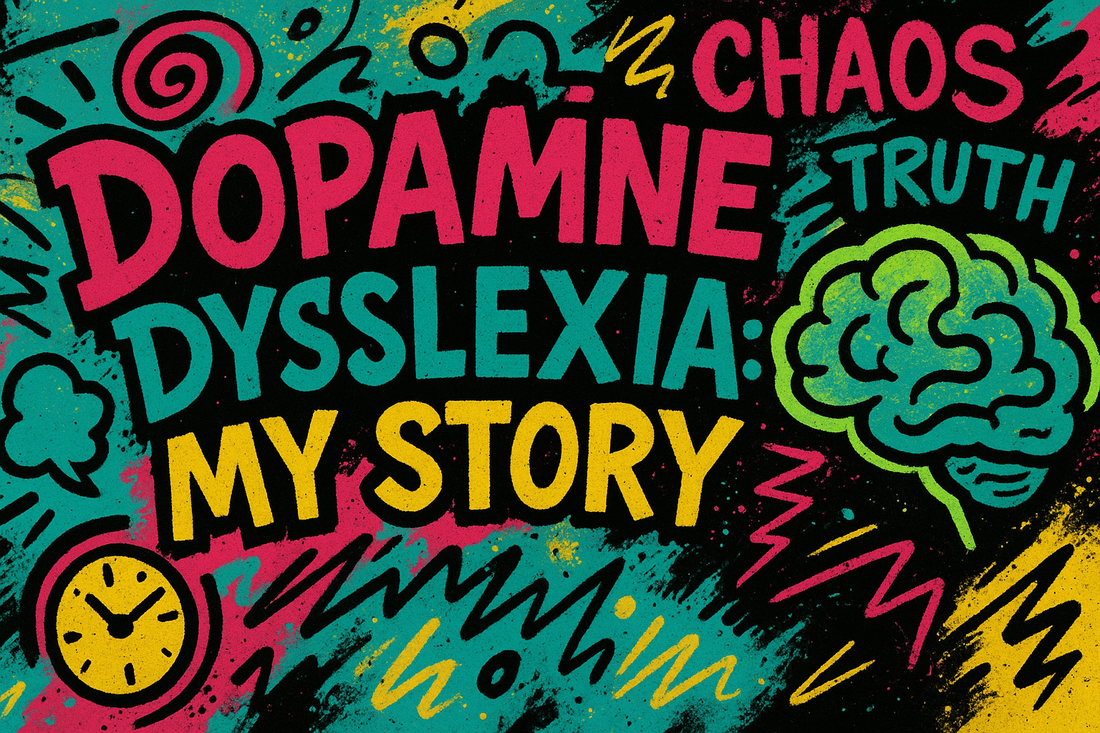
Dopamine And Dyslexia_ My Story
Share
If you’ve ever wondered why you reach for your phone every few minutes or feel restless when nothing exciting is happening, you’re not alone. In our latest episode, Stephen Martin tackles dopamine’s strange power over us, especially for those who have ADHD or dyslexia. He shares personal stories about addiction, impulsivity and the messy world of constant gratification that we all get trapped in sometimes.
We also explore practical ways to keep dopamine in check, from medication to supplements and even phone fasts. If you’re dealing with dyslexia or ADHD, or you just want to build healthier habits, this episode offers a hopeful look at how to reshape our routines and give our minds some breathing room.
Understanding the Dopamine Rollercoaster
Dopamine is often called the “feel-good chemical,” but it’s more about chasing rewards than rewarding you. It pushes you to keep scrolling, keep checking or keep snacking, long after you know you should stop. For those with ADHD, dopamine’s influence is even stronger. Dyslexia can add another layer of complexity, since many people with dyslexia also experience ADHD traits.
“I had to look at my phone usage and think, ‘What am I doing to my brain with these dopamine hits?’”
We live in a world built to trigger dopamine. From social media likes to shopping apps, everything is a tap or a swipe away. Even if you don’t have ADHD, it’s easy to feel pulled into unhealthy patterns. But recognising our triggers is the first step toward breaking free of this rollercoaster.
ADHD and Dyslexia: Two Sides of the Same Coin?
Being neurodivergent can mean your brain craves stimuli. That’s why you might have hyperfocus episodes, where you’re “in the zone” and lose track of time. Then, at other times, you can’t sit still for five minutes. Dyslexia brings its own challenges, like struggling with reading, but it can also spark creative thinking.
Many adults with dyslexia only discover they have ADHD later in life. The link is often missed, but it makes perfect sense. Both conditions can create a tug-of-war on your attention span, and at the heart of it all is dopamine. When you understand that, you’re better equipped to build new habits that serve you rather than sabotage you.
Strategies for Building Dopamine Resilience
Stephen emphasises that dealing with dopamine issues isn’t just about reducing pleasure in life. It’s about finding balance and staying mindful of what fuels your mental health. Here are a few strategies he touches on:
- Medication: Sometimes medication like Vivants helps regulate dopamine levels for people whose brains struggle to balance on their own.
- Supplementation: Adding something like L-tyrosine to your routine can support dopamine production. Always check with a health professional before starting anything new.
- Phone Fasts: Deliberately stepping away from your phone or social media for a set time can reset your dopamine baseline.
These steps might not erase every challenge you face, but they can give you breathing room to focus and regain control. Experiment with small changes first, then add more if they work well for you.
Practical Tips for Everyday Life
Phone addiction is one of the toughest things to manage. It’s not just about willpower—it’s recognising that your phone’s constant notifications are designed to hijack your dopamine system. Try turning off non-essential notifications or scheduling “phone-free” blocks into your day. Even shifting your phone out of reach during meals can make a difference.
Routine matters too. Creating a simple schedule, even if it’s just for the morning, helps your mind adjust to predictable patterns. Regular exercise can also be a game-changer; it boosts dopamine while helping you burn off restless energy.
No matter what you try, it helps to talk to others. Connect with fellow dyslexics or ADHDers who get it. Sharing your experiences isn’t just validating, it also sparks new ideas for living more comfortably in your own brain.
Why Dopamine Struggles Are Manageable
There’s a large community out there dealing with similar issues. Dopamine imbalances show up in all kinds of ways: impulsive spending, social media obsessions or even substance abuse. But the huge takeaway is that awareness leads to action. Once you see how this chemical affects you, you can make real changes.
Building healthier habits can take time, and sometimes you’ll slip up. That doesn’t mean you’ve failed. Tune back into that awareness and remind yourself it’s a normal part of the neurodivergent journey. You might not banish your phone addiction or restlessness overnight, but every small change stacks up.
- Key Takeaways
- Dopamine is the driving force behind many ADHD and dyslexia behaviours.
- Our modern world feeds on quick dopamine hits, which can be damaging.
- Hyperfocus is dopamine’s way of hooking you on tasks that stimulate you.
- You can manage dopamine levels with medication, supplements or mindful tech use.
- Regular “phone fasts” help break the cycle of endless scrolling.
- It’s normal to struggle, but support and awareness make all the difference.
If you want the full skinny on this fascinating topic, don’t miss the complete episode. You’ll find the podcast player right at the top of this page. Give it a listen and let us know your thoughts.
Join the club at rightbrainresetters.com
Get 20% off your first order at addednutrition.com
Find out more at truthaboutdyslexia.com
Join our Facebook Group at facebook.com/groups/adultdyslexia

